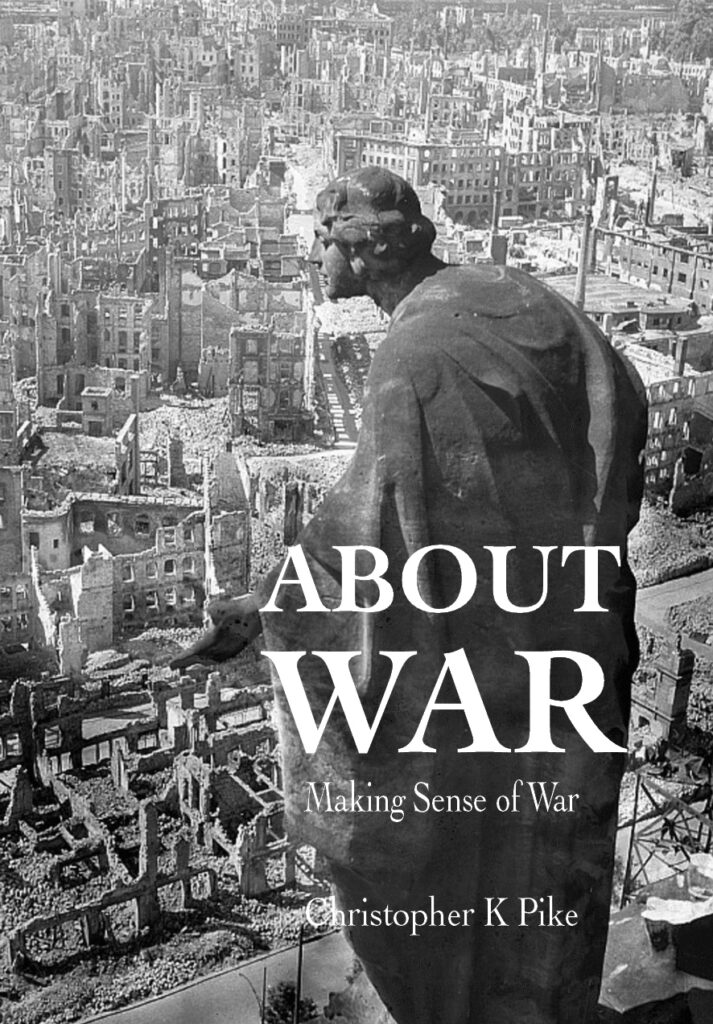Book One: About War

What the readers say…
‘…an interesting and informative start to the series…’ (Making Sense of War)
‘…an original and lively study…’
‘…concise, comprehensive, approachable read…’
‘…this book is incredibly interesting, well researched and most importantly well written…’
‘…what a fascinating and intensively researched book…’
‘… a sharp, original study that makes the complexities of war understandable without oversimplifying…’
‘…an extremely useful and important text for a complex topic, well written and interesting…’
About War
About War is the first book in the trilogy Making Sense of War. Throughout human history, war has been a decisive force in shaping the political landscape, serving not just as an act of aggression or defence but as a complex political instrument. War, at its core, is a political act, an extension of political agendas and conflicts by other means. The international context of war reveals how global alliances, geopolitical strategies, and the pursuit of national interests drive nations into conflicts that reshape borders, economies, and societies.
The causes of wars are deeply rooted in the strategic ambitions of nations, influenced by the desire to control resources, assert dominance (or variously defined power), or respond to perceived threats – the security dilemma. These motivations are framed by the international context, where the interplay of power, diplomacy, and alliances sets the stage for conflicts.
The strategy involved in warfare—ranging from military tactics to psychological operations—reflects the intricate interplay of political will, economic pressures, and human valour.
Looking to the future, it is clear that the character of war is evolving, though not the nature, with technological advancements and changing geopolitical landscapes opening new fronts and introducing fresh challenges.
However, the fundamental political nature of war remains unchanged. War continues to be a tool used by states to pursue their interests on the international stage, a reflection of humanity’s enduring struggle for power and survival.
As we navigate this ever-changing landscape, it is crucial to understand the political aspects of war and its role in human history. Recognizing war as a political act within an international context allows us to better anticipate its causes and potentially mitigate its occurrence. The future for war, while uncertain, demands our attention and understanding, as the stakes for global peace and security are higher than ever.
Chapters
1 | War in History: The Persistence of War |
2 | What is War? |
3 | Causes of War; Causes of Peace |
4 | The International Context |
5 | Politics and ‘Politics’ |
6 | Strategy as the Link between Politics and the Use of Armed Force |
7 | Civil–Military Relations and Governance |
8 | Legitimate or Illegitimate War? |
9 | Technology and the Military–industrial Complex |
10 | Nuclear Considerations |
11 | The Future for War |
12 | Reconciling the Narratives |
Appendices |
Summarized Chapter: What is War? in About War
The concept of war is interpreted differently among generations and cultures. Older generations may associate war with the titanic struggle against fascism in World War II; subsequent generations have limited exposure to war and may view it as something that happens ‘somewhere else’. War is a political act, and defining it precisely is challenging since it involves enormous human cost, and uncertain political outcomes.
The United Nations Charter forbids war, and they have no specific definition of it but instead identifies ‘aggression’. The French definition views war as a state of armed conflict between several constituted political groups, such as states, making it an act of foreign policy or defence. The French define war as the last resort after diplomatic negotiations.
Defining war in various countries’ constitutions is difficult since there are no clear guidelines or definitions. The U.S. Constitution contains fewer words devoted to Congress’s role in declaring war than the issue of copyrights and patents. The U.S. Department of Defense has a publication entitled ‘DOD Dictionary of Military and Associated Terms’, which contains no definition of war. Similarly, the United Kingdom constitution, being largely uncodified, has no specific guidance on the subject.
Warfare, on the other hand, is the practice of conducting war on the battlefield or war-space. It is the realm of soldiers, sailors, and airmen, of munitions, logistics, and geography, and increasingly, cyber-warriors. The media’s general portrayal of war focuses on ruined cities or discussions on defence budgets rather than politics and social considerations. For example, the bombing of Libya in 2011 ignored the tribal divisions that were only kept under control by the dictator, Muammar Gaddafi, and removing him inevitably resulted in carnage.
No two wars are the same since and their outcomes unknown – some social scientists hold that only half of wars achieve the original objective. What the Americans call the ‘blood and treasure’ costs are considerable and unknown at the start of the conflict.. For instance, the Football War fought between El Salvador and Honduras in 1969 had about 3,000 casualties compared to Nazi Germany versus Soviet Russia, which had more than 14 million military deaths and 20 million civilian deaths.
In conclusion, war is a complex concept that is almost impossible to define precisely. War is a political act, and warfare is the practice of conducting war on the battlefield or war-space.
Media’s portrayal of war often focuses too much on the consequences rather than politics and social considerations, leading to a limited understanding of the overall concept.